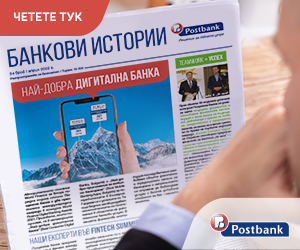Petia Dimitrova: “Digitalization and financial literacy are key topics on our path to the Eurozone”
Mrs. Dimitrova, let’s start our conversation with a topic that is as current as it is familiar to you at Postbank. Digital banking is developing extremely fast. What new digital services can bank customers expect?
The contribution of the banking sector is extremely notable in this respect. Digital innovations are one territory where we at Postbank not only feel good but also feel at home. Habits today differ from those of yesterday because life imposes its own dynamics. The accelerated implementation of high-tech solutions enhances the user experience. Thus, we provide our customers with even higher quality, faster, and more efficient banking services because the foundation of banking is the relationship between the consumer and the financial institution. In this process, the major market players have an advantage because we possess the resources and means to implement various technological solutions and ensure even higher quality and efficiency in banking services. Digital cards, virtual wallets, and QR-code payments are all part of the new reality. However, the speed of technological transformation depends on the people in the team.
At Postbank, we make significant investments in process re-engineering and human resources to create client-friendly applications that enhance the pleasure of interacting with us. The Phygital model is the future of banking. Hybrid forms of banking, a complex model blending digital and physical services, and consumer experience across different channels and platforms – sequentially, in real-time – are what we do at Postbank and what our clients expect. On the other hand, digital payments play a crucial role in stimulating economic growth, innovation, and consumer convenience.
In 2024, we expect to see an increased use of blockchain technology in various financial processes, including cross-border payments, trade finance, and supply chain management.
What are your leading products and applications?
We are witnessing an increasingly clear interest in the mobile wallet, ONE wallet by Postbank, in which users can easily and quickly register, including those who are not clients of the bank. In 2023, we added new and attractive functionalities to our innovative mobile application. Any client can invite a friend to the application, with whom they can explore the exceptional possibilities of Postbank’s modern solution.
We developed the digital assistant EVA – a chatbot based on artificial intelligence technology, proficient in both Bulgarian and English. The service focuses on communication and provides clients the opportunity for real-time consultation. We also developed our career chatbot in Viber to find the most suitable candidates for us. Our unique digital zones for express banking are an excellent example of a value-added service, which also aligns with our policy to seek sustainable digital solutions.
Lately, there has been increasing talk about financial literacy in children and training to build this key life skill in young people.
Like in every generation, young people follow trends, seek new products, and look for individualized, personalized solutions. I would like to draw attention to a recent analysis that outlines the spending characteristics of Gen Z and how financial institutions can attract the interest of young people. According to it, the youth of this generation exhibit a relatively good financial culture, with 43% of Gen Z and millennials realizing the need to be proactive in planning their finances, compared to only 20% of those over 55. Furthermore, 79% of Gen Z expect more personalized treatment and membership in loyalty programs. With the creation of our innovative “Project YOUth” program, our goal was to expand young people’s access to personalized and secure financial solutions that will assist them in developing the necessary culture regarding budget management, building new savings habits, and responsible consumption. Today, we are even happier to note the positive trend we have observed in the last year and a half, which once again confirms that we have achieved our goal. Let me point out that investments in education, qualification improvement, and competence development are far from new to Postbank. These are our long-term commitments, so the bank implements numerous initiatives focused on young people’s advancement, as well as many other corporate social responsibility programs. Among our leading projects in education are the large-scale initiative with the National Trade and Banking High School and the Private Professional High School of Banking, Commerce, and Finance, strategic partnerships with the American University in Bulgaria, SoftUni, the educational program conducted in cooperation with Finance Academy, and the collaboration with Sofia University St. Kliment Ohridski for a master’s program in “Finance and Banking”. Postbank is also part of the partner community of the mentoring program “Mentor the young”, aiming to provoke real change in the professional career, and personal lives of participants by giving them the opportunity to meet with established professionals from different market sectors.
But that’s not all. Together with other member banks of the Association of Banks in Bulgaria, we have even more initiatives in the field of environmental protection, social policies, and corporate governance, the so-called ESG. The role of banks is primarily to focus on the areas where we can have the most significant impact to achieve positive effects. Banks are key players in the green transformation, accelerating the path to climate neutrality not only through the decarbonization of our operations but also through prioritized financing of our clients’ projects. Environmental protection is the most visible aspect of these initiatives, but it is far from the only one. We lead in promoting good governance practices, women’s participation in management, and the independence of our control bodies.
From digital projects and financial literacy, let’s shift our focus to the field of national strategic goals. What are your expectations for the benefits of Bulgaria’s admission to the Eurozone?
Whenever it happens, Bulgaria’s accession to the Eurozone and the adoption of the world’s second most used currency is a long-anticipated process. This step will positively impact our economy and will be a driver for accelerating reforms, increasing prosperity, and reaching European living standards. It will offer numerous benefits to citizens and companies, not only by reducing transaction costs but also by improving the investment environment, activating local and foreign investments, with increased investment activity expected to support employment.
This shift will certainly have a positive effect on lending, opening many additional opportunities, including for the development of capital markets in Bulgaria. Let’s consider a few examples specific for banks. Currently, banks hold 12% of deposits in the form of minimum mandatory reserves at the Bulgarian National Bank (BNB), which in numerical terms amounts to over 16 billion BGN. BNB uses these funds for free of charge, while in the Eurozone, the minimum reserve requirements is 1%, and the ECB pays 4% interest on excess reserves. This means that banks are deprived of over 600 million BGN in additional income annually, which goes to the state through BNB.
It’s important to remember that a significant portion of Bulgarian banks will pay a 15% profit tax this year, which, under equal conditions, translates to about 200 million BGN more in revenue for the budget. These taxes will aid in reducing the budget deficits that have expanded over the past two years.
Eurozone membership will offer another benefit. Currently, banks must allocate capital for purchasing Bulgarian government securities in euros and for holding euro deposits at BNB, which is highly illogical given that we have been in a currency board for over 25 years. This year, the effect is expressed in appropriximately 400 million BGN of additional capital, and next year it is expected to double. Instead of guaranteeing risk-free loans to the state, this capital could enable us to increase loans to the real economy by several billion leva.
The ECB will be able to act as a lender of last resort, minimizing the risk of bank failures due to a liquidity crisis. Bulgaria will no longer be a ‘silent letter‘ at the ECB but will have the opportunity to participate in the bank’s management and make decisions regarding monetary policy, instead of just suffering the effects of other countries’ decisions. Although, all banks in Europe follow the same laws and regulations, being outside the Eurozone, we bear the burden without the benefits.
Adopting the euro is expected to boost Bulgaria’s international trade, especially in agriculture, services, and tourism, as well as in certain manufacturing sectors where Bulgaria has already established strong positions within the EU networks.
In the Association of Banks in Bulgaria, we plan to launch an explanatory campaign among citizens, for which we count on the support of BNB and the government, to explain all the benefits of adopting the euro, which will significantly improve the business environment for everyone. Banks, businesses, and the state must unite to communicate cleatly and help our clients, our employees, and the society navigate through the abundance of information and counteract misinformation, enabling everyone to understand the advantages of adopting the euro. The euro has already become a part of our daily lives, with a significant portion of real estate prices listed in euros, and Bulgarian citizens frequently conducting transactions in this currency.
For us, banks, it is important to meet all requirements and prepare our information systems accorrdingly. We will invest additional resources in cybersecurity enhancements and increase security measures, protections against cyber-threats such as hacking, malware, or phishing.
This preparation, besides being time-consuming, is also very expensive – the total amount that banks are expected to spend on the introduction of the euro – for the exchange of circulating money, as well as for the necessary modifications to their information systems and awareness campaigns is estimated to be between 300 and 400 million BGN.
Are there expectations for interest rates, like prices, to rise with the introduction of the new currency?
No, there is no basis for such expectations. On the contrary – the time has come for their reduction. Major central banks like the ECB, the Federal Reserve, and others have announced that they will soon start cutting the key interest rates. In particular, the Federal Reserve has announced that three cuts to the main interest rate are expected by the end of the year.
Monetary policy has been and will continue to be key to controlling inflationary processes. Therefore, inflation would hardly have started to fall so quickly if actions had not been taken in terms of monetary policy by major central banks.
The experience of the most recently joined Eurozone countries shows that the immediate effect of joining the Eurozone on price levels is in the range of a 0.3-0.5% increase in inflation. Unlike many other countries, we are in a currency board and will join the Eurozone with a fixed exchange rate of 1.95583 leva for one euro, which serves as additional protection against price increases.
Financial experts increasingly talk about excessive bank lending to individuals, leading to a “bubble” in property prices, inflated consumption, and inflation, instead of banks lending to companies. How would you comment?
I disagree with these comments. I’d like to provide the following data for a 10-year period where it’s clear that banks lend sensibly and responsibly. The charts below clearly show that the growth in consumer and mortgage loans is comparable to income growth and GDP growth. Looking at the data for the size of the average wage, we see that in the last 10 years, it has increased 2.7 times, and the minimum wage has increased 3 times, which is more than the increase in consumer and mortgage loans – the higher household incomes are sufficient to service most of the loans they have taken. For the same period, the nominal GDP has increased 2.2 times to 184 billion BGN.
The data also show that household debt to GDP in Bulgaria is 23%, while the same ratio for the 27 European Union countries is 55% – two and a half times less, which means that we cannot talk about over-indebtedness of the population in the country but quite the opposite.
The decrease in unemployment contributes to this – according to NSI data, it has fallen threefold since 2013 to 4.3%, which means that, practically, in large cities and among highly educated Bulgarians, it is close to zero.
Lately, there has been a lot of talk about inflation and how it erodes the real incomes of the population. Let’s not forget that food and energy carriers have the largest share in the consumer basket, and accordingly, the increase in their prices is the main “culprit” of inflation.
The next chart clearly shows that in the last 10 years, the real incomes of the population have increased – even during the last two highly inflationary years, Bulgaria was one of the few countries in the EU where there was a double-digit growth in average remunerations and real income growth.
Logically, higher incomes and a growing real estate market lead to more savings for the population. In just the last year, household deposits have increased by a record 8.3 billion BGN, with growth of a colossal 2.28 billion BGN in December last year alone.
What should a bank client with a deposit do before and during the change from leva to euros? And with a loan?
The operation of existing contracts – for loans, deposits, financial instruments in levs, or with references to leva – will not change or be canceled. Loans and deposits will be converted at the fixed central rate of 1.95583 leva for 1 euro. We will ensure that in 2025 all accounts are automatically and freely converted into euros, which will be much easier and more convenient for clients than physically exchanging cash.
As for interest rates – fixed interest rates on loans will be preserved, and floating interest rates cannot be higher than before the introduction of the euro – i.e., no client will be disadvantaged by the change.
Is there a chance that someone will not be able to exchange all their leva if they keep them at home?
No, but I would advise clients to use the months before the adoption of the euro to deposit the cash they have in their bank accounts – and the sooner they do it, the better.
To facilitate this process, we at Postbank were the first to launch a campaign to encourage Bulgarians to deposit cash held at home into their bank accounts for free in the months before the introduction of the euro. A similar initiative in Croatia was very positively received by the population, and in the year before the euro was introduced, cash in circulation decreased by 40%.
For the first six months after the introduction of the euro, banks will mandatorily provide a free exchange of banknotes and coins from leva to euros, and the Bulgarian National Bank will exchange banknotes and coins from leva to euros for free indefinitely. The law will allow banks to introduce fees for the cash exchange 6 months after the introduction of the euro in Bulgaria, so it is good for clients to act well before this to avoid fees and to take advantage of the benefits that cashless banking offers.
Which reminds me that lately, there’s been a lot of talk about how high bank fees are and how much banks earn from them. The truth is that the main part of our revenue – over 70% – comes from interest, and only a fifth from fees and commissions. Maintaining a branch network is expensive and becomes more expensive due to wage growth and inflation, so we try to encourage our clients to use our digital service channels, which are much cheaper for them. However, this is not accounted for by statistics, and therefore there’s a perception in society that banking services are becoming more expensive, while in reality, this is not the case.











